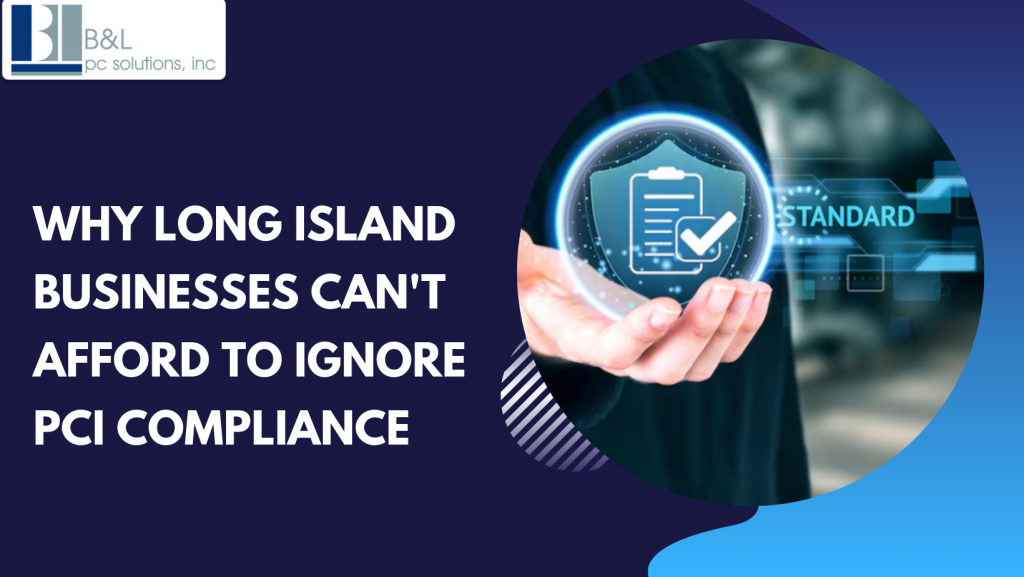
Here's a number that should worry every business owner on Long Island.
In 2023, only a few companies operating out of Long Island met all the PCI compliance standards. Is your company one of them? If not, you are probably breaking federal payment card rules right now, and you don't even know it.
The fines start at $5,000 monthly and climb to $100,000 per month until you fix the problems. New York makes things worse with its own cybersecurity rules through the Department of Financial Services. When businesses get caught, the total damage averages $14 million from revenue loss, legal bills, fines, and the customers who stop coming because they no longer trust you.
Walk down Main Street on any Long Island town and you will see dozens of businesses that accept credit cards. Most of their owners think they are following the rules because their payment processor never complained. They are wrong, and it will cost them heavily. Connect with trusted IT managed service providers on Long Island.
Why Your Merchant Agreement is Actually a Legal Contract
Remember signing up for credit card processing? That stack of papers you initiated on every page? Buried in there was your promise to follow PCI Data Security Standards. You probably skipped that part and focused on the processing fees.
Payment Card Industry rules are not suggestions from Visa and MasterCard. They are contractual requirements that you legally agreed to follow. Break them, and you have violated a binding business agreement. The penalties can shut down your entire operation.
This is not some distant government regulation that nobody enforces. Your merchant processor actively monitors compliance, particularly after data breaches make headlines. They are not doing this for your benefit. They are protecting themselves from liability when your security failures cost them money.
The Four Business Categories
The payment card industry groups merchants into four groups. These categories are created according to the annual transaction volumes. Don't assume smaller means safer:
- Level 1 - The Giants (Over 6 million annual transactions)
These companies undergo comprehensive audits by certified security assessors. They spend millions on compliance teams because the fines for violations can exceed $500,000 monthly. - Level 2 - Regional Chains (Between 1-6 million annual transactions)
Think Applebee's locations or regional grocery chains. They complete detailed questionnaires annually and undergo scanning quarterly by approved security vendors. Many Long Island car dealerships and larger restaurants fall in this category. - Level 3 - Growing E-commerce (20,000-1 million online transactions)
Any business doing serious online sales hits this level fast. The compliance requirements match Level 2, but scrutiny focuses heavily on website security since online fraud are rampant. - Level 4 - Everyone Else (Under 20,000 online or 1 million in-person)
Most Long Island businesses fit in here. Don't get comfortable, though. Level 4 still means annual paperwork, quarterly scans, and the same basic security rules as bigger companies.
Twelve Rules That Could Save or Sink Your Business
PCI compliance breaks down into twelve specific requirements. Get them wrong, and you are looking at automatic violations during any security review:
- Secure Your Networks
Your internet connection needs a proper firewall. Default passwords must be applied to every piece of equipment that handles credit card data, from your main computer to the tablet you use for processing payments. - Protect Card Data
Stop storing full credit card numbers. Retain what you strictly require for legal commercial purposes. Encrypt everything else. Your penalties can fall if hackers cannot interpret the stolen information. - Fight Off Malware
Every computer in your business needs current antivirus software with automatic updates. This includes that old laptop in the back office that nobody uses anymore, but still connects to your network. One infected machine compromises everything. - Control Who Sees What
Not every employee needs access to payment systems. Create individual user accounts for each person, give them only the access their job requires, and track what they do. - Watch Your Network
Someone needs to monitor who's accessing your systems and when. Unusual activity at 3 AM on a Sunday might indicate problems. Physical security matters too. Lock up those payment terminals and computers when you are closed. - Document Everything
Write down your security procedures, train your staff properly, and update your policies when things change. Auditors love seeing organized documentation.
Real Steps for Real Businesses
Getting compliant is not rocket science, but it requires systematic attention to details most business owners ignore.
- Figure Out Your Level
Count last year's credit card transactions across all locations and payment methods. Different levels mean different paperwork and different deadlines. - Complete Your Self-Assessment
Most small businesses fill out SAQ-A (if customers enter card details on someone else's website) or SAQ-D (for everything else). These questionnaires force you to evaluate your current security against the required standards. Answer honestly. - Schedule Quarterly Scans
Approved Scanning Vendors check weaknesses that hackers use by means of automated security checks of your network. Failing scans must be corrected within 30 days, or your merchant processor may impose fines. - Fix What's Broken
Scan results show devices connected to your network, but they are not active. They also show outdated technology and systems that are not set up according to norms. Address every discovered weakness and record your steps taken to fix it. - Submit Documentation
Your merchant processor wants completed questionnaires and clean scan results according to their schedule. Missing deadlines causes compliance breaches and possible processing limitations. - Keep Continuing Compliance
Yearly questionnaires and quarterly scans are conducted on a permanent basis. PCI compliance is a continuous corporate need that requires ongoing focus, not a one-time project.
What Compliance Actually Costs
Yearly Expenses for Compliance:
- Self-assessment fulfilment: $300–600 (with professional aid)
- Quarterly security checks: $800–1,500 yearly.
- Upgrade of fundamental security systems: $1,200–3,000
- Employee training: $400–900 every year
- Constant monitoring: $600–2,000 annually
Data Breach Reality Check:
- The average small business breach is around $3 million, according to the IBM 2024 study.
- Forensics investigation: $75,000 to $250,000
- Cost towards legal matters: $100,000–400,000
- Penalties for disregarding regulations: $10,000–750,000 (seriousness is considered)
- Lost revenue during recovery: often 30–50% of usual income.
- Customer notification expenses: $15,000–50,000
- Credit monitoring for affected customers: $200–500 per person per year
Spend a few thousand annually on compliance, or risk losing everything you have built.
Technology that Makes Compliance Simpler
- End-to-End Encryption
The moment the card is used, the information gets encrypted. The data remains protected even if the cybercriminals access other areas of the protected system. Many newer point-of-sale systems include this feature automatically. - Tokenization Services
Instead of storing actual card numbers, tokenization substitutes meaningless tokens that have zero value to criminals. You can still process returns and handle customer service, but stored data becomes worthless to attackers. - Cloud Payment Processing
Reputable cloud processors handle much of your compliance burden through their secure data centers and dedicated security teams. This shifts technical responsibility to vendors with resources you can't match internally.
Mistakes That Guarantee Violations
Long Island businesses repeatedly make the same compliance errors. Avoid these common traps:
- Keeping Unnecessary Data
- Ignoring System Updates
- Skipping Employee Training
- Overlooking Vendor Security
- Weak Physical Controls
Why Local Businesses Work with B&L PC Solutions
Managing ongoing compliance demands requires expertise that most small business owners don't have time to develop. As the leading IT support services on Long Island, we have spent years helping Long Island companies navigate these requirements without disrupting their daily operations.
Our local focus means we understand local business challenges. We know which solutions work for seasonal businesses versus year-round retailers. We speak the same language as local business owners.
Here's what we handle for clients:
- Complete compliance assessment and level determination
- Self-assessment questionnaire preparation and submission
- Quarterly vulnerability scanning through certified vendors
- Remediation planning when scans identify problems
- Employee training customized for your specific business
- Ongoing monitoring and maintenance
- Emergency response when security incidents occur
Beginning with Compliance
As hackers develop new attack strategies and technology exposes new vulnerabilities, payment security rules are constantly evolving. Companies that establish a strong compliance basis now adjust more quickly to future developments and safeguard themselves from present dangers.
Every Long Island business owner faces the same choice: invest in proactive compliance management or gamble with consequences that could end everything they have worked to create. The stories of local businesses destroyed by preventable security breaches grow longer every month.
Don't wait for problems to force compliance. Take control now while you still can.
For a detailed and professional assessment of your compliance levels, please contact B&L PC Solutions. We are a trusted IT managed service provider on Long Island. We will run a check on your existing situation, define the tasks you are responsible for, and show you how to comply with the rules.
Contact us, your reliable IT company on Long Island.





